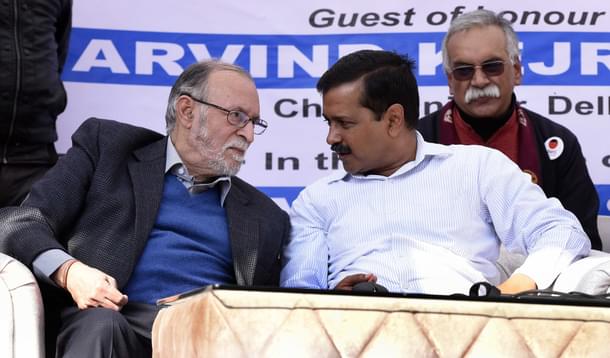Politics
Explained: National Capital Territory of Delhi (Amendment) Bill, 2021
Tushar G.
Mar 25, 2021, 11:57 AM | Updated 11:57 AM IST
Save & read from anywhere!
Bookmark stories for easy access on any device or the Swarajya app.


The National Capital Territory of Delhi (Amendment) Bill, 2021, was passed by the government in the Rajya Sabha yesterday (March 24). The bill gives greater powers to the Lieutenant Governor (LG) to a certain extent while ensuring more accountability of the Delhi Legislative Assembly, however, within the constitutional framework.
On March 22, the bill had been passed by the Lok Sabha. Under the bill, soon to be a law, the amendments have been made to the Government of National Territory of Delhi Act, 1991.
Why The Bill?
The Government of National Capital Territory of Delhi Act, 1991, was enacted in order to supplement the provisions of the Constitution relevant to the Legislative Assembly and a Council of Ministers for the territory of Delhi.
Within the statement of object and reasons of the bill, the government has highlighted Section 44 of the Act which deals with the conduct of the business.
The government stated that there was no structural mechanism within the act to ensure time-bound implementation of the rules under the section. Also, the law gives no clarity about what proposal or matters need to be taken up with the LG before issuing any order.
Two, the Centre has also stated within its object and reasons that the amendment was brought to give effect to the interpretation made in the case by the Supreme Court in Government of NCT of Delhi v/s Union of India.
In the same verdict, the Supreme Court held that the LG was bound by the aid and advice of the Council of Ministers and was in no position to act independently, thus ruling in the favour of the then government of the Aam Aadmi Party (AAP).
At stake is also Clause (4) of Article 239AA of the Constitution which deals with the special provisions with respect to Delhi.
The clause states how in case of a difference of opinion between the LG and the Delhi government, the LG can refer it to the President and the decision of the President in this aspect would be binding, thus leaving a point of contention between the government of Delhi and its LG.
Major Highlights of the Bill, Soon To Be A Law
Firstly, the bill redefines Government as the LG for Delhi and it would apply to any law made by the Legislature in Delhi.
Two, through Section 3 of the bill passed, there will be an extension to the powers of LG by adding a new clause to Section 24 of the 1991 act which deals with the assent to the bills. Within this section, the additional clause via the amendment will ensure that it now covers any matters that fall outside the purview of the powers conferred on the Legislative Assembly.
The new bill also makes an amendment to Section 33 of the 1991 act which dealt with the rules of procedure.
The act of 1991, in Section 33, says that the Legislative Assembly may make rules for regulating, subject to provisions of this act, its procedure, and its conduct of the business. However, the amendment shall add ‘which shall not be inconsistent with the Rules of Procedure and Conduct of Business in House of People’ at the end of conduct of the business.
Against ‘provided that’ in the 1991 act, the amendment will add a clause to Section 33 to extend the meaning. Now, the legislative assembly will not make any rule to enable itself or its committee to consider matters of the day-to-day administration of Delhi or conduct inquiries in relation to the administration of Delhi. Also, most importantly, the provisions are sought to be made retrospective, thus voiding all such existing committees.
Through Section 5 of the amendment, an additional clause will be added to Section 44 of the 1991 act that deals with the conduct of business. The additional clause makes it compulsory for the government to obtain the opinion of the LG on all matters before any executive action can be taken, ensuring accountability.
This also ends the ambiguity that persisted when it came to time-bound implementation of the laws and the confusion surrounding matters where LG consultation was necessary.
While political clashes are expected between the Delhi government led by Arvind Kejriwal and the Centre, the amendments, soon to be notified, will enable a better relationship between the state and the centre while rightfully elevating the role of the governor with provisions consistent with the act of 1991.
Tushar is a senior-sub-editor at Swarajya. He tweets at @Tushar15_





